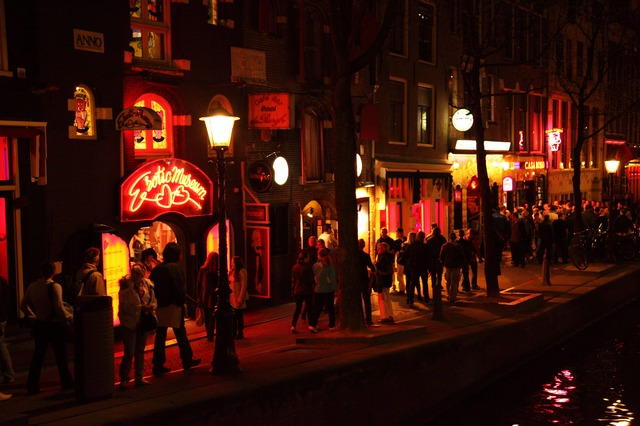Trafficking of women in this country is certainly alarming. However everything seems to indicate that the government is manipulating the statistics to use them for their own benefit. The Prisma’s Memoirs. July 2012.
_

César Amaya Sandino
There are no definitive statistics for it, but those that do exist allow governments a free hand to act against immigration and prostitution.
And it is under this discriminatory and restrictive law that the police are increasing their raids on sex workers, and increasing their checks and requirements on immigrants.
Meanwhile, governments turn their backs on the real social problems and on gender equality issues, as it is easier to invest in law and order, than in social policies that can help many women to leave prostitution.
This is because the criminalization of sex workers leads to the opposite effect: “Instead of lifting them out of prostitution, it institutionalizes it”.
We continue our discussion of this situation in the last instalment of our interview with Cari Mitchell, a member of the English Collective of Prostitutes.
Are you against prostitution, generally?
The first statement that we ever made was called “For prostitutes and against prostitution”. We are for the workers, and against the work.
What is happening to the rights of sex workers?
We have produced a rights sheet for sex workers back in the 80s. We’ve always known that sex workers need something in our hands in order to protect ourselves from being criminalised, but we’ve never been able to afford to update our original rights sheets. However, it became more urgent after the last government really brought in a whole moral crusade against prostitution. They really targeted sex workers and brought in more repressive legislation against in the Policing and Crime Act, which gives the police much more power who go after sex workers both on the street and indoors.
The number of women who come to us really increased massively and we knew that if women had more information about the laws they would have been better able to protect themselves against prosecution. So we managed to get some money for a year to produce a new rights sheet. We worked with a lot of people in doing it and it’s so that women have in their hands a sheet about how to protect themselves from being criminalised. But also, it is going to be very useful as a piece of public information to inform people in general about the effects- about what the laws are about. It’s almost impossible to work safely within the law.

Do you think this can continue?
Yes, while there is inequity. Women are always going to find that sex work is one way you can earn some money. Some women are always going to feel that’s one way, whether or not you are in financial difficulty. It’s inevitable that some women are going to feel I’ll to do sex work as opposed to gardening, or hairdressing, or teaching, or to be a doctor or whatever. Is also a choice. But we are nowhere near that situation yet; we are still in a situation where women are forced to work in the sex industry because of lack of other ways to survive.
But we think prostitution will always be around. You can exchange money for sex, why not? It’s only sex.
Is it related to machismo?
No, it’s part of a society where it is men who have a bit of money in their pockets, and women who need a bit of money in our pockets.
Are there mafias involved in trafficking women to the UK?
There are a lot of lies of the whole question of trafficking. The Policing and Crime Act is a very oppressive piece of legislation that is now in place, and was brought in on the back of lies, essentially, about the number of women who were trafficked into this country. At that time there was, and there still is, a lot of misinformation about the number of women coming to the country who were trafficked. But there are immigrant women coming into the country who know that they are going to work in the sex industry. They may have had to pay somebody to help them come in, they pay them off and then they’re working independently.
That’s not uncommon because the immigration laws here, and coming into this country can be very difficult. There was an article in the Guardian in 2009 showing that the numbers that the police were using about trafficking were wildly exaggerated or entirely false. Despite this, the lies still continue.
How do they use this in their favor?
Immigration has been a very big part of the agenda in the previous government as well as in this government. So where they can, where they find women who are immigrant sex workers and deport them. They really use trafficking against women; and raids have also has prevented women who are being held from coming forward and reporting to the police because they fear arrest or deportation.
 So it isn’t common . . .
So it isn’t common . . .
The stereotypical situation of a woman being picked up from a country where she is very vulnerable, not knowing what she is doing, being bundled into a van, forced to work somewhere against her will, and not being able to get away, is not anything like as common as it’s portrayed.
That very typical situation is relatively rare. Of course, it does happen, and happens particularly in places where women are even more vulnerable.
In places where there have been wars, and general devastation in the community. But the vast majority of immigrant women working in the sex industry in this country are not in that situation, are working independently.
Has there been an increase in police action against sex workers recently?
Absolutely. Sex workers are being increasingly targeted and the legislation from at least 2008. In the run up to the introduction of this legislation, police raids started to increase.
When the legislation came in, in 2009, the raids increased and have really continued to increase. And now, the Metropolitan Police have been given large amounts of money to raid… and this is the latest excuse for police to go and disrupt, and to close down premises where women are working, have worked for years and are working together with others more safely.
If you could influence the policies, what ought to be done?
The government should instruct the police not to prosecute sex workers. Any force or coercion that is going on has to be able to be reported to the police so that violent men can be brought to justice. But most sex workers know that if they come forward to report, they are going to get prosecuted.
The government has to instruct the police to stop raiding and prosecuting and to make absolutely clear that women must be able to come forward and report any kind of force without fear of being arrested. That’s the first priority.

They have to make sure that women have enough money in our hand so that we don’t have to go into the sex industry in the first place; from welfare benefits to money for mothers. They have to ensure child benefit which is on hold and it’s not being increased, for mothers, as well as disability benefits; so they have to stop cutting all kinds of benefits.
Does the law stop women from being sex workers?
The Crown Prosecution Service is prosecuting women who they know are just trying to survive. And this poverty is affecting everybody. Women who are seriously ill, women who are elderly, women who are helping women to stay safe while they work are being prosecuted.
Once women have a criminal conviction it is very, very difficult to get another job, so a criminal conviction really prevents them from leaving prostitution and institutionalizes women in prostitution.












.jpg)












